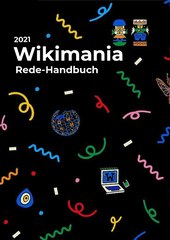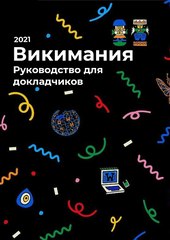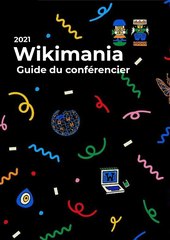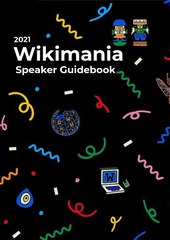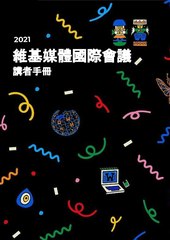2021:Submissions/Guidelines/uz
Umumiy
Muqaddima
Bizning birinchi virtual Vikimaniya 2021 yil 13-17 avgust kunlari bo'lib o'tadi. Wikimania - bu Vikimedia harakatining har yili o'tkaziladigan konferentsiyasi bo'lib, ko'ngillilar hamjamiyati tomonidan amalga oshirilgan barcha bepul bilim loyihalarini nishonlaydi.
The largest gathering of the Wikimedia movement, this year’s virtual Wikimania will be bigger than ever and enable more Wikimedians to come together to create, celebrate and connect with each other!
Vikimedia harakatining eng yirik yig'ilishi, bu yilgi virtual Vikimaniya har qachongidan ham kattaroq bo'ladi va ko'plab Vikimedianlar bir-birini yaratish, nishonlash va o'zaro bog'lanish uchun birlashishga imkon beradi!
Bu yilgi virtual Vikimaniyaning mavzusi Vikipediyaning 20 yilligi. Biz harakatimiz o'tmishiga nazar tashlaymiz, bugungi kunimizni nishonlaymiz va kelajakka umid qilamiz. Asosiy e'tibor bizning loyihalarni boshqaradigan odamlarga qaratilgan.
Bu yilgi mavzu global va xilma-xil harakatlarimiz bo'ylab odamlarni diqqatini jalb qilishning ajoyib usuli haqida.
Tadbir ishtirokchilari
This year’s virtual Wikimania will be a key opportunity to open up participation to a wide group of people, with different levels of knowledge and expertise.
The content of the event therefore should be accessible to newcomers, people with intermediate knowledge, and the more experienced community members among us.
Program Design
We will be sharing more about the skeleton for Wikimania’s program design in the next few weeks.
However, we wanted to already share what to expect. The program of the event will be delivered through a mix of live and on-demand content. We will archive all of the content delivered on Wikimedia Commons.
- Main Stage: the space where keynotes, endnotes, entertainment and other key content will be delivered.
- Movement Groups and Affiliates Track: a track curated by community organizations. Submissions to this track are open to all affiliates in the Wikimedia community.
- Individual/Collective Track: a track curated by COT, specifically for individuals or a collective of individuals. Submissions to this track are open to everyone.
- Unconference track: as the name suggests, this is a free space, where the wider community has complete freedom to curate the track.
- Hackathon: as traditionally done, Wikimania will also have the first 24 hours of the event dedicated to the Hackathon.
- Networking Space: Wikimania will have several virtual venues where attendees can socialize and meet other wikimedians from around the globe and link up to work together on new or established projects. More information will be provided soon.
Scope
With Wikimania going virtual this year it gives the movement an opportunity to consider topics from every corner of the movement.
The Core Organizing Team has put some thought into how these topics will be organized in this year's program. We want to allow for enough freedom for attendees to choose from a wide variety of topics, and for applicants to find an area that aligns with their interests.
In this page we want to talk about how the program will be organized.
Topics
| The official guidance for all topics is to choose a lens of either PAST - PRESENT - FUTURE, Where we would like to briefly reflect on the past but want to emphasize where we are in the present, and more importantly, where we are heading in the future. |
We want to be able to give enough freedom to choose from a wide array of session topics, as there are many cross-cutting themes that affect all of our communities. See some examples below:
- Education & GLAM: Initiatives and projects of the last 20 years focused on the use and access of Wikimedia projects in educational spaces at all levels and working with GLAM institutions.
- Partnerships: Collaborations with movement partners, governmental institutions, technology partners, open source organizations. Learnings, opportunities, case studies, best practices and new ideas.
- Advocacy, Safety & Community Health: Initiatives focused on Human Rights work, advocacy, misinformation + disinformation, building safer communities both online and offline, codes of conduct. Initiatives that address past, present and future challenges, learnings etc.
- Strategy 2030: Initiatives, discussions, meetings, roundtables regarding the 2030 movement strategy, especially related to the implementation phase.
- New Voices & Newcomers: Initiatives, ideas, projects etc to involve, identify, attract + retain incorporate new voices/voices currently underrepresented as part of the Wikimedia movement. Initiatives led by historically underrepresented groups. Initiatives led by emerging communities.
- Community Topics: Policies, best practices, tools and lessons that support interwiki + on-wiki work.
- Our stories: A reflection on our own personal journeys within the movement. Reflection on the people who got us to where we are. See this category for ideas.
- Innovation & Research lab: Lab to present new innovative projects and initiatives. For example: what future project would you like for Wikimedia?
- Gender, Diversity & Inclusion: Gender, diversity and inclusion projects that contribute to the creation of a more diverse and inclusive movement and/or Internet, both online and offline.
- Language: All language issues, indigenous or others. A few potential topics include Wikidata lexicography, outreach to underserved languages and wikis, sessions on re-use of material (templates, modules, etc.) across several language wikis etc.
- Other: A space for any other topic that is deemed cross-cutting in our movement.
Type of sessions
There is no single host for this year’s virtual Wikimania, but rather an experiment in which our whole community can be involved
: by and for the community. We wanted to give the space for our communities and individuals to participate in the program, and have therefore created a few pathways in which you can curate a piece of the program by allocating 2 separate and concurrent tracks. The content in these tracks can be presented live, or you can submit pre-recorded content for us to include in the programming.
- Live Session: Your session would be hosted live, which would allow for live contributions, questions and dialogue from the attendees.
- Pre-Recorded Session: Your session can also be pre-recorded - it will be live streamed at Wikimania 2021. This option reduces the amount of attendee interaction you would have with your content but you can also host a live dialogue or Q&A after your recorded session. Our production team has been instructed to manage and support you in recording your session and making sure deadlines are met.
In case you are unable to meet the recording deadlines and requirements, your session will have to be live or withdrawn.
Language Accessibility
With Wikimania 2021 being a global virtual event we have a great opportunity to deeply consider the language and timezones of participants.
With in-person events we're limited to accommodating a single time-zone (and the jetlag that comes with it) and generally a small number of languages. This year we will have sessions that are both live and pre-recorded and available with interpretation or translation.
Read on to learn about the approach we are taking and how the submissions will be supported.
Approach
In the past, Wikimania catered to an English speaking audience only.
However, we want to enable more people from our movement to be able to access Wikimania in a language they feel comfortable in and we are experimenting with new approaches.
We recognize that we will not be able to accommodate every single person and community, and have learned from the Movement Strategy events how important language accessibility is.
- For all sessions (live and pre-recorded) delivered in English, the Wikimedia Foundation will provide live translation in the form of simultaneous audio interpretation from English into Arabic, French, German, Russian, Spanish and Mandarin to enable a bigger audience to join and participate freely. We will be sharing more on how this will look like closer to the event.
- For all sessions (live and pre-recorded) delivered in Arabic, French, German, Russian, Spanish and Mandarin, the Wikimedia Foundation will provide translation in the form of simultaneous audio interpretation into English.
- Pre-recorded sessions: can be presented in any language you would like. As far as Closed Captions are concerned, we are looking into providing automated solutions for this purpose. More to come on this in the near future!
Please refer to the table below for a visualization of our approach.
| Live session | Pre-recorded session | |||
|---|---|---|---|---|
| In English | In other languages | In English | In other languages | |
Organizer provides: Audio Translation to:
|
N.A. |
|
N.A. |
|
Organizer provides: Audio Translation to:
|
YES | NO | YES | NO |
| Organizer provides: Closed Captioning to English | YES | NO | YES | NO |
| The presenter provides: Transcription to English | NO | NO | OPTIONAL | OPTIONAL |
Submission language
In order for all session reviewers to be able to read through submissions, and accurately be able to review, we ask for all submissions to be in English.
However as mentioned above, sessions can be presented in any language to the audience.
Tracks
The basis of the entire Wikimedia movement is around sharing and learning.
This couldn't be any more true of Wikimania, the Wikimedia movement's largest annual gathering.
We gather this year to celebrate the humans that make the projects possible and look forward to providing space for those who want to share their work through a session at Wikimania.
This year peer-reviewed submissions will be open to
:
- Movement Groups & Affiliates: from the huge independent chapters to the small user groups.
- Individuals or a collective of individuals: any person, duo, trio, quartet or larger group of individuals.
Both these tracks will run concurrently with each other.
Movement Groups & Affiliates track
This track is dedicated to sessions presented by movement groups & affiliates.
This will be open to all (new or established) affiliates in the Wikimedia Movement. Whether you are a regional grouping, a thematic affiliate, a small user group, or a local chapter -- we welcome all of the different organizational groupings within the Wikimedia movement. This track might be an excellent opportunity to highlight the people, the projects and the impact they have created in your community and beyond.
We highly encourage you to spotlight and celebrate new voices, faces, and projects in your community, in addition to the individuals in your community that receive more recognition in the movement.
Individual/Collective track
This track is dedicated to sessions presented by individuals, or a collective of individuals i.e it will be open to anyone interested in participating in the program.
Whether you have been active in the movement for years, or just months. You are welcome even if this is your first time speaking to a large audience. Just like the other track, all session formats are welcomed. Traditionally we always have a large variety of people that are a part of the program for Wikimania.
With this approach we keep this same spirit of previous years.
Time Allocation: Track vs Format
There is a difference in how time is being allocated per track.
Different formats will be receiving a difference in time allocation. We’ll explain the differences below.
- Lecture-based session: 20 mins presentation + 10 mins of Question & Answer
- Discussion (roundtable, panel): 45 mins
- Workshops + Tutorials: 45 mins
- Celebrations/Entertainment: 30 mins
- Fireside chat / interviews: 30 mins
- Lightning talks: 10 mins
Movement Groups & Affiliates track
We wanted to give the Wikimedia movement groups and affiliates a chance to own a part of the program.
We are allocating a maximum 1.5 hours per group to curate. This would correspond with 3 lecture-based presentations. You can choose what formats you would like to present your content in.
Please refer to the section above for the time allocation for each format.
Individual/Collective track
Time allocation will be based on the format chosen during submissions.
Please refer to the section above for the time allocation for each format.
Application Examples
You have the freedom to choose how to incorporate this lens to your topic of choice.
- Example 1: Movement Groups & Affiliates (1.5 hour)
- You want to submit a proposal for a lecture-based session with a series of lectures about the challenges you have experienced in the Education space within your community.
- By applying PAST - PRESENT - FUTURE you could choose this format per session.
- PAST: Explaining how this challenge emerged and how you got involved in the past. You could do a look back at your most pressing challenges.
- PRESENT: What is the current state of your challenge? What progress have you made to date? Were there any blockers that prevented you from progressing?
- FUTURE: sharing how your future plans and outcomes look like. How do you plan on progressing on the initial challenge, what is the road ahead? What are the successes and failures you can expect? Are you collaborating with anybody in the movement?
- Example 2: Movement Groups & Affiliates/ Individuals and collective
- You want to host a facilitated discussion session around common challenges and solutions in closing the gender gap on-wiki, with an international panel of community representatives and gender diversity activists.
- By applying PAST - PRESENT - FUTURE you could choose this format:
- PAST: N/A
- PRESENT: Closing the Gender Gap is a relevant topic currently, how does the expansion of the concept of gender in western society affect the Wiki Community/humanity as a whole, and what have we done to address the challenges, concerns and barriers? What are we doing to disseminate the knowledge around the concept of gender across the globe? What has been your personal experience with the concept of gender and inclusion?
- FUTURE: How will we continue to be pioneers in creating an open and safe space for everyone - indifferent of their gender. What will we do to bridge the gap and motivate gender diversity, among other categories?
- Example 3: Movement Groups & Affiliates/ Individuals and collective
- You want to host a workshop session on how to incorporate safe space policies in any organization and will host this workshop with different individuals across different organizations leading the way.
- By applying PAST - PRESENT - FUTURE you could choose this format
- FUTURE: A workshop on how to implement Friendly Space Policies: What will future organizations and workplaces look like? How can we help accelerate and embrace change? What initiatives are leading the way in re-imagining organization and society itself?
Dos and Don'ts
Dos
- DO feature a case study that highlights cross-regional collaboration.
- DO invite a local or international activist you or your grouping have worked with to speak during your session.
- DO submit sessions as a collective of people that have been working together on a project.
- DO focus on global approach with regional case studies.
- DO consider the wide range of your audience that might vary from new to well known members of the community.
- DO work with different types of media during your session: video, illustrations, voice clips etc.
- DO celebrate your community’s achievements.
Don'ts
- DON’T make your session a show-and-tell but rather think of ways in which you can make the content engaging.
- DON’T use highly technical language if you are catering your session to newcomers, preferably define your technical concepts, regardless of who your audience is - you could always have someone who is not on the same page as you.
- DON’T assume that everyone has the historical background that you do around the community or topic at large.
- DON’T fill your presentation slides with a lot of information and small text. Use your slides as a tool to highlight important information and have a visual representation of what you are speaking of.
Important Dates and Information
| Task | Deadline |
|---|---|
| Submission open | 28 May 2021 |
| Submission close | 20 June 2021 |
| Submission period Open | 3 weeks |
| Review | 21 June 2021 - 2 July 2021 (2 weeks) |
| Acceptance to submitter | 5 July 2021 - 9 July 2021 |
Get help
Reading all of this information could leave you with questions.
We therefore will be making ourselves available for office hours.
More information on when and how to engage with us will be provided next week.
In the meantime you can leave your questions for the Core Organizing Team at our help_desk.
Speaker Training Series
In the past, and most recently in 2019, Wikimania had offered “Learning Days” as part of the pre-conference activities of the in-person event.
For the virtual edition of Wikimania, the Community Development team at the Wikimedia Foundation has conducted Speaker Training program that all speakers were invited to. It was not mandatory to participate in the speaker training to speak at Wikimania.
The materials from the training are available for anyone to use:
Speaker Guidebook
-
German
-
Russian
-
Arabic
-
Spanish
-
French
-
English (+links to audio recordings)
-
Chinese (Mandarin)
Ingredients of Great Public Speaking (24 minute video, English)

